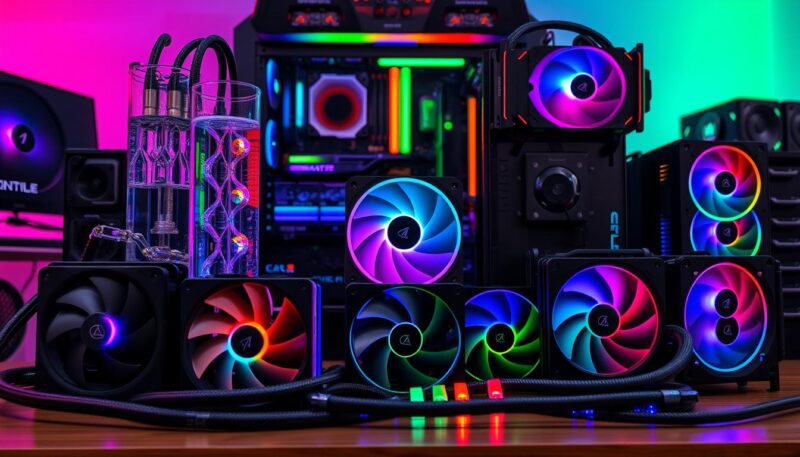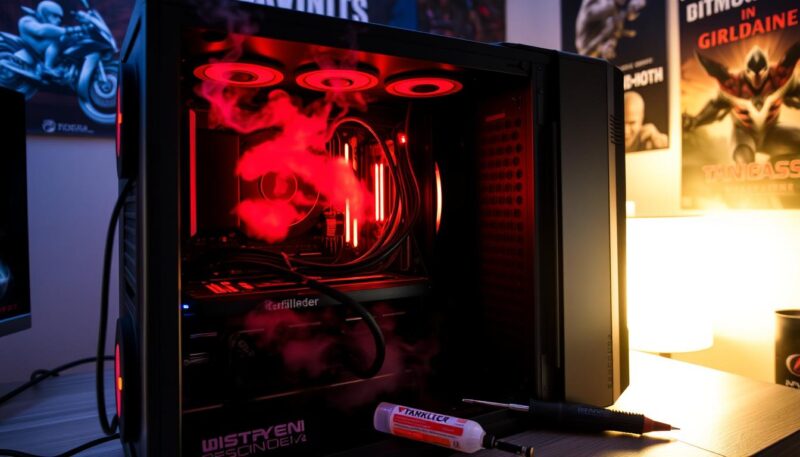Overheating in gaming PCs is an issue that every gamer must confront at some point, and understanding how to troubleshoot this problem is crucial for system longevity and optimal performance. When you push your gaming rig to its limits with demanding titles or intensive multitasking, it’s easy for temperatures to spike. This can lead to a range of PC performance issues, including reduced frame rates, system crashes, or even irreversible hardware damage. Recognizing the signs of overheating is just the first step.
Common causes such as blocked air vents, dust accumulation on fans, and outdated software can all contribute to overheating. Additionally, you may encounter challenges posed by resource-intensive applications, particularly those that tax your CPU and GPU.
In this guide, you’ll not only find effective cooling solutions but also practical maintenance tips that can help mitigate overheating risks. Proper troubleshooting of overheating in gaming PCs involves knowing when to act and which solutions—like applying thermal paste or utilizing external cooling systems—will make the most difference.
With regular monitoring and application of the solutions outlined here, the days of gaming with anxiety over your system’s temperature can be behind you. Let’s dive deeper into the intricate world of overheating in PCs, understand what truly causes it, and discover how you can keep your gaming rig performing at its best.
Understanding Overheating in Gaming PCs
Overheating in gaming PCs is a prevalent issue that can disrupt your gaming experience. Identifying the common causes can help you prevent problems before they escalate. Physical factors, such as dust buildup or blocked air vents, can significantly reduce airflow, contributing to overheating. It’s essential to be aware of these factors to maintain optimal performance.
Common Causes of PC Overheating
Several overheating causes can lead to degraded performance and potential hardware failure. These issues include:
- Dust Buildup: Dust accumulation inside the case can obstruct fans, hindering airflow and leading to higher temperatures.
- Blocked Air Vents: If vents are blocked, hot air cannot escape, causing internal temperatures to rise.
- Defective Fans: Non-functional or underperforming fans can result in inadequate cooling, putting components at risk.
- Outdated Software: Software that fails to efficiently manage resources can exacerbate issues, particularly with demanding applications.
Common symptoms of overheating include an unstable system, increased CPU temperature, GPU overheating, and hardware malfunctions. Regular maintenance is critical in addressing these issues. It is advised to clean your system every 3-6 months, depending on your environment.
Impact of Resource-Intensive Applications
Resource-intensive applications place a considerable strain on your gaming hardware. Regular gaming sessions or multitasking, such as running multiple browser tabs, can impact CPU temperature control. Running demanding programs may generate significant heat, particularly if you are using outdated or insufficient cooling solutions.
| Application Type | RAM Usage | Heat Generation | Notes |
|---|---|---|---|
| Video Editing Software | Up to 20GB | High | Increased risk of CPU overheating |
| Gaming | Varies | Moderate to High | Control CPU and GPU temperatures |
| Web Browsing (multiple tabs) | Up to 10-20GB | Moderate | Tab overload can lead to overheating during gaming |
Troubleshooting Overheating in Gaming PCs
Dealing with overheating in your gaming PC can be a daunting task, but implementing effective strategies can make a significant difference. Focus on cooling solutions that enhance the performance and longevity of your setup. Regularly performed fan maintenance and thermal paste application are essential components of gaming PC maintenance. Additionally, utilizing monitoring and managing software can aid you in keeping an eye on system temperatures, ensuring smooth operation under load.
Effective Cooling Solutions
To tackle overheating, start with cooling solutions that improve airflow. Position your gaming PC on hard surfaces and ensure that vents are unobstructed to allow for optimal heat dissipation. Regular cleaning is vital; aim to cleanse internal components, particularly the fans, of dust accumulation every 3-6 months to maintain peak performance. Embrace cooling upgrades such as external cooling systems or additional heat sinks, which can bolster heat management significantly. Under heavy usage, the CPU may reach temperatures between 140-176°F (60-80°C), while the GPU can climb up to 158-185°F (70-85°C). Staying vigilant about these metrics is crucial for avoiding CPU overheating and ensuring efficient GPU temperature control.
Thermal Paste Application and Maintenance
Thermal paste application plays a critical role in maintaining cooling efficiency. This paste facilitates heat transfer from the CPU and GPU to their respective heat sinks. Old or dry thermal paste can lead to increased component temperatures, making timely reapplication essential. Follow detailed instructions for applying thermal paste correctly, and if you are inexperienced, consider seeking professional help to avoid damage during the process.
Monitoring and Managing Software
Software management is another critical aspect in preventing overheating. Utilize monitoring software to track your CPU and GPU temperatures. Regular checks during heavy gaming sessions can help identify overheating risks before they escalate. Close any unneeded background applications to free up resources, optimizing performance. Keeping all software updated prevents inefficiencies, which can exacerbate heat generation within your system. Regular scans for malware through reliable managing software is recommended, as malicious programs can significantly heighten CPU workload, leading to dangerous temperature spikes.

| Component | Temperature Range under Load | Recommendations |
|---|---|---|
| CPU | 140-176°F (60-80°C) | Regular thermal paste application, overclocking management |
| GPU | 158-185°F (70-85°C) | Adjust graphics settings, enhance cooling solutions |
| Fans | N/A | Clean every 3-6 months, adjust speeds for better airflow |
| Software | N/A | Regular updates and malware removal scans |
Conclusion
To effectively tackle the challenges of troubleshooting overheating in gaming PCs, implementing a range of strategies is essential to enhance your gaming performance. Understanding the underlying causes, such as high-intensity software demanding too much from your CPU and GPU, coupled with blocked air vents, can help you take proactive measures. Proper management of PC airflow is crucial to prevent heat build-up, as inadequate cooling can lead to irreversible damage and a shorter lifespan for your valuable equipment.
Adopting effective cooling techniques, including regular cleaning of your gaming rig every 3-6 months and maintaining the functionality of your cooling fans, contributes significantly to controlling temperatures. Additionally, being mindful of software management, such as keeping your drivers updated and minimizing background tasks, can alleviate strain on your system, preventing excessive heat production while gaming. You can easily elevate your gaming experience by making these simple yet significant adjustments.
Ultimately, ensuring that your computer setup remains dust-free and well-ventilated will pay off in maintaining balanced temperatures across all components. By embracing these troubleshooting measures, you empower yourself to enjoy seamless gaming sessions without the interruptions caused by overheating. Stay vigilant, and watch your gaming performance soar to new heights!

